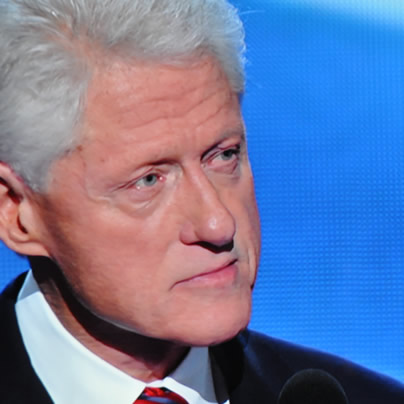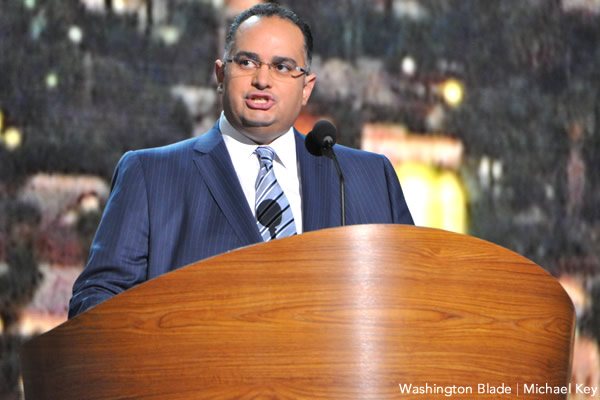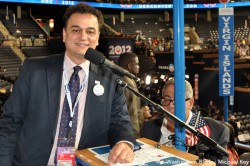National
DNC 2012: Clinton delivers rousing speech at convention
Defends Obama on economy, attacks Romney


Former President Bill Clinton addressing the Democratic National Convention (Blade photo by Michael Key)
CHARLOTTE, N.C. — A rousing speech from former President Bill Clinton that capped off Wednesday night at the Democratic National Convention was well-received by attendees, although the day wasn’t free of controversy.
Clinton took to the podium at the Time Warner Cable Arena to call formally for the nomination of Barack Obama as the Democratic nominee for president, but not before taking digs at Republican nominee Mitt Romney and others for what he said were false assertions about the current administration.
Among the accusations made by GOP vice residential nominee Paul Ryan that Clinton disputed was the claim that Obama robbed Medicare of $716 billion in an effort that could imperil the benefits of seniors.
“Here’s what really happened,” Clinton said. “There were no cuts to benefits. None. What the president did was save money by cutting unwarranted subsidies to providers and insurance companies that weren’t making people any healthier. He used the saving to close the donut hole in the Medicare drug program, and to add eight years to the life of the Medicare Trust Fund. It’s now solvent until 2024. So President Obama and the Democrats didn’t weaken Medicare, they strengthened it.”
The former president, who signed welfare reform into law in 1996, also took issue with Republican claims that Obama had waived the work requirement for welfare reform — an assertion echoed last week by former U.S. Sen. Rick Santorum on stage at the Republican National Convention.
“When some Republican governors asked to try new ways to put people on welfare back to work, the Obama administration said they would only do it if they had a credible plan to increase employment by 20 percent,” Clinton said. “You hear that? More work. So the claim that President Obama weakened welfare reform’s work requirement is just not true, but they keep running ads on it.”
Clinton also came to Obama’s defense on the economy, saying the economic situation that had befallen the nation in 2008 under the Bush administration was so dire that Obama couldn’t be expected to reverse course in just one term in office, but more progress should be seen in a second term.
“President Obama started with a much weaker economy than I did,” Clinton said. “No president — not me or any of my predecessors could have repaired all the damage in just four years. But conditions are improving and if you’ll renew the president’s contract you will feel it.”
The former president also touted Obama’s signature legislative achievement — the Affordable Care Act — saying claims that it amounts to a government takeover of health care are untrue.
“Soon the insurance companies, not the government, will have millions of new customers — many of them middle class people with pre-existing conditions,” Clinton said. “And for the last two years, health care spending has grown under 4 percent, for the first time in 50 years. So are we all better off because President Obama fought for it and passed it? You bet we are.”
Clinton, who signed into law “Don’t Ask, Don’t Tell” and the Defense of Marriage Act, made no reference to LGBT issues during his remarks. The former president has come out for marriage equality and has since called for DOMA repeal and an end to the military’s gay ban before it was ultimately lifted.
But Clinton did express gratitude to former President George W. Bush for creating the President’s Emergency Plan for AIDS Relief when talking about the accomplishments of former Republican presidents and how he could never hate the GOP the way the far right hates Obama.
“I am grateful to President George W. Bush for PEPFAR, which is saving the lives of millions of people in poor countries and to both Presidents Bush for the work we’ve done together after the South Asia tsunami, Hurricane Katrina and the Haitian earthquake,” Clinton said.
Attendees at the Democratic National Convention were captivated by Clinton as he delivered his remarks. His speech was punctuated by applause and shouts of “Four more years! Four more years!” After the remarks, Obama entered onstage alongside Clinton, who gave a bow to the current president before the two embraced.
Adam Ebbin, a gay delegate from Virginia and member of the Virginia State Senate, told the Washington Blade after Clinton’s speech that the former president “made the case for why we need to re-elect the president” and to keep health care reform on the books.
“When he talked about health care and what it meant, and economic polices and tax fairness, I think it really resonated with the crowd here in the hall and hopefully with the crowd at home,” Ebbin said.
U.S. Senate candidate Elizabeth Warren, who’s locked in a tight race to unseat Sen. Scott Brown (R-Mass.), also delivered remarks that stirred the audience as she emphasized the struggle of the middle class to achieve the American dream and took a dig at Romney’s infamous remark that “corporations are people.”
“No, Gov. Romney, corporations are not people,” Warren said. “People have hearts, they have kids, they get jobs, they get sick, they cry, they dance. They live, they love, and they die. And that matters. That matters because we don’t run this country for corporations, we run it for people. And that’s why we need Barack Obama.”
But in comparison to Tuesday, when at least four openly gay speakers took to the podium and a multitude of others who spoke incorporated references to LGBT rights in their remarks — explicit references to the LGBT community were fewer on Wednesday.
The most notable exception were remarks from gay California Assembly Speaker John A. Perez, who talked about the advancement of LGBT rights in addition to addressing women’s and immigrant-related issues. However, he wasn’t given a primetime slot.
Perez addressed the continued lack of federal non-discrimination workplace protections.
“In too many states, even some folks who have a job wake up every morning in fear that they will lose that job simply for being gay, lesbian, bisexual or transgender,” Perez said. “We fight for them.”
Perez also praised Obama for repealing “Don’t Ask, Don’t Tell” and for coming out in support of marriage equality, saying they’re evidence of Obama working to protect and advance “opportunities” for all American people.
“He repealed ‘Don’t Ask, Don’t Tell,’ giving LGBT Americans the opportunity to proudly and openly serve our nation in uniform,” Perez said. “And he’s standing up for the right of LGBT Americans to say, ‘I do.'”
More gay speakers should follow at the convention. Gay Rep. Barney Frank (D-Mass.), who’s retiring from Congress at the end of this year, was initially slated to speak on Wednesday, but he agreed to move his speech to the next day due to, according a Democratic official, the “overwhelming enthusiasm in the arena and extended applauses.” Lesbian U.S. Senate candidate Tammy Baldwin is scheduled to speak on the same day.
Other speakers also made note of LGBT issues or touted the Obama administration’s progress on them. References to “Don’t Ask, Don’t Tell” repeal were made by Congressional Black Caucus Chair Emanuel Cleaver II (D-Mo.), Rep. Luis Guiterrez (D-Ill.) — who also mentioned marriage equality — and House Minority Leader Nancy Pelosi (D-Calif.). California Attorney General Kamala Harris, who refused to defend Proposition 8 in court, also incorporated marriage equality in her speech, saying the American dream belongs to “the men and women across this country who know it shouldn’t be against the law to marry the person you love.”
The day also saw controversy as a result of the party platform. Shortly after the gavel time starting the session for the day, party leaders attempted to amend the platform after controversy ensued to include a mention of God in the manifesto as well as an assertion that Jerusalem is the capital of Israel. The amendments reportedly were backed by Obama.
Democratic National Committee chair and Los Angeles Mayor Antonio Villaraigosa had to ask for three voice votes to get the the two-thirds vote necessary for the changes.
But Democrats were unified at the end of the evening when the roll call of the states was read to formally award delegates to Obama to make him the Democratic nominee for president. All of the 5,963 delegates were awarded to Obama. Notably, at least three of the speakers representing their states during the roll call were gay: Colorado State Democratic Chair Rick Palacio; New Hampshire State Democratic Chair Ray Buckley; and Rhode Island House Assembly Speaker Gordon Fox.
After the roll call, Buckley told the Blade being able to represent New Hampshire in the nominating process for Rhode Island was deeply personal for him because he recalled that each state had sent this year at least one LGBT delegate to the convention.
“The only time I really choked up was when we did the roll call, and the fact every single state and territory had at least somebody [LGBT] there,” Buckley said. “Some little gay kid — when they’re 12, 13 realizes they’re gay — is going to realize that this is the party that will stand for them and stand with them, and welcome them and empower them and embrace them. Not a lot of people gave a lot of positive reinforcement to people my age when we were adolescents and I think it sends a very powerful message.”
New York
Two teens shot steps from Stonewall Inn after NYC Pride parade
One of the victims remains in critical condition

On Sunday night, following the annual NYC Pride March, two girls were shot in Sheridan Square, feet away from the historic Stonewall Inn.
According to an NYPD report, the two girls, aged 16 and 17, were shot around 10:15 p.m. as Pride festivities began to wind down. The 16-year-old was struck in the head and, according to police sources, is said to be in critical condition, while the 17-year-old was said to be in stable condition.
The Washington Blade confirmed with the NYPD the details from the police reports and learned no arrests had been made as of noon Monday.
The shooting took place in the Greenwich Village neighborhood of Manhattan, mere feet away from the most famous gay bar in the city — if not the world — the Stonewall Inn. Earlier that day, hundreds of thousands of people marched down Christopher Street to celebrate 55 years of LGBTQ people standing up for their rights.
In June 1969, after police raided the Stonewall Inn, members of the LGBTQ community pushed back, sparking what became known as the Stonewall riots. Over the course of two days, LGBTQ New Yorkers protested the discriminatory policing of queer spaces across the city and mobilized to speak out — and throw bottles if need be — at officers attempting to suppress their existence.
The following year, LGBTQ people returned to the Stonewall Inn and marched through the same streets where queer New Yorkers had been arrested, marking the first “Gay Pride March” in history and declaring that LGBTQ people were not going anywhere.
New York State Assemblywoman Deborah Glick, whose district includes Greenwich Village, took to social media to comment on the shooting.
“After decades of peaceful Pride celebrations — this year gun fire and two people shot near the Stonewall Inn is a reminder that gun violence is everywhere,” the lesbian lawmaker said on X. “Guns are a problem despite the NRA BS.”
New York
Zohran Mamdani participates in NYC Pride parade
Mayoral candidate has detailed LGBTQ rights platform

Zohran Mamdani, the candidate for mayor of New York City who pulled a surprise victory in the primary contest last week, walked in the city’s Pride parade on Sunday.
The Democratic Socialist and New York State Assembly member published photos on social media with New York Attorney General Letitia James, telling followers it was “a joy to march in NYC Pride with the people’s champ” and to “see so many friends on this gorgeous day.”
“Happy Pride NYC,” he wrote, adding a rainbow emoji.
Mamdani’s platform includes a detailed plan for LGBTQ people who “across the United States are facing an increasingly hostile political environment.”
His campaign website explains: “New York City must be a refuge for LGBTQIA+ people, but private institutions in our own city have already started capitulating to Trump’s assault on trans rights.
“Meanwhile, the cost of living crisis confronting working class people across the city hits the LGBTQIA+ community particularly hard, with higher rates of unemployment and homelessness than the rest of the city.”
“The Mamdani administration will protect LGBTQIA+ New Yorkers by expanding and protecting gender-affirming care citywide, making NYC an LGBTQIA+ sanctuary city, and creating the Office of LGBTQIA+ Affairs.”
U.S. Supreme Court
Supreme Court upholds ACA rule that makes PrEP, other preventative care free
Liberal justices joined three conservatives in majority opinion

The U.S. Supreme Court on Friday upheld a portion of the Affordable Care Act requiring private health insurers to cover the cost of preventative care including PrEP, which significantly reduces the risk of transmitting HIV.
Conservative Justice Brett Kavanaugh authored the majority opinion in the case, Kennedy v. Braidwood Management. He was joined by two conservatives, Chief Justice John Roberts and Justice Amy Coney Barrett, along with the three liberal justices, Sonia Sotomayor, Elena Kagan, and Ketanji Brown-Jackson.
The court’s decision rejected the plaintiffs’ challenge to the Affordable Care Act’s reliance on the U.S. Preventative Services Task Force to “unilaterally” determine which types of care and services must be covered by payors without cost-sharing.
An independent all-volunteer panel of nationally recognized experts in prevention and primary care, the 16 task force members are selected by the secretary of the U.S. Department of Health and Human Services to serve four-year terms.
They are responsible for evaluating the efficacy of counseling, screenings for diseases like cancer and diabetes, and preventative medicines — like Truvada for PrEP, drugs to reduce heart disease and strokes, and eye ointment for newborns to prevent infections.
Parties bringing the challenge objected especially to the mandatory coverage of PrEP, with some arguing the drugs would “encourage and facilitate homosexual behavior” against their religious beliefs.
-

 U.S. Supreme Court4 days ago
U.S. Supreme Court4 days agoSupreme Court upholds ACA rule that makes PrEP, other preventative care free
-

 U.S. Supreme Court4 days ago
U.S. Supreme Court4 days agoSupreme Court rules parents must have option to opt children out of LGBTQ-specific lessons
-

 National5 days ago
National5 days agoEvan Wolfson on the 10-year legacy of marriage equality
-

 Congress5 days ago
Congress5 days agoSenate parliamentarian orders removal of gender-affirming care ban from GOP reconciliation bill















